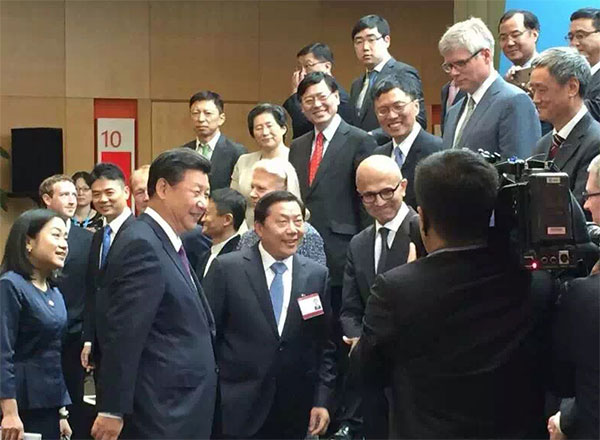What's next for China's Internet economy?
- By Nicolas Santo
 0 Comment(s)
0 Comment(s) Print
Print E-mail China Daily, December 17, 2015
E-mail China Daily, December 17, 2015
|
|
|
Chinese President Xi Jinping talks with tech executives at 8th US-China Internet Industry Forum in Seattle, Sept 23, 2015. [Photo by Lao Jiang/Provided to chinadaily.com.cn] |
President Xi Jinping's picture, taken last September in Seattle, with some of the most influential Chinese and American Internet tycoons is an inspiration to entrepreneurs, particularly those seeking to launch ventures in China. Even in the face of more competition, with 700 million online users in one country, entrepreneurs who launch Internet ventures in the Chinese market have the odds of succeeding in their favor. This week's World Internet Conference from December 16 to 18 is a good occasion to pause and reflect on some of the challenges facing China in this new, innovation-driven phase of its economic development where technology will play a key role. Let's discuss the three questions that remain largely unanswered.
1. Will SMEs take advantage of the Internet+ policy?
The Internet+ policy aims at turning China into the world's leading Internet powerhouse. Local governments, however, will need to design and execute policies to encourage small and medium enterprises (SMEs) to embrace the Internet as the main factor to drive their business's growth. In cities such as Foshan, initiatives like Internet + Finance or Internet + Manufacturing are already in place. These programs are creating new opportunities for traditional businesses. For example, Everstar Clothing, a Shunde-based company, has seen booming business in terms of online sales of its custom-made clothes, as reported by the China Daily. The company has directly benefited from local government policies and, in 2014, it reported over 40,000 online orders. That said, the greatest risk of the Internet economy is that it tends to create market dynamics in which the winner takes all. Just look at what happened with Uber in the US. If SMEs do not surf the Internet+ wave, then the Internet+ policy has not been effective.







Go to Forum >>0 Comment(s)